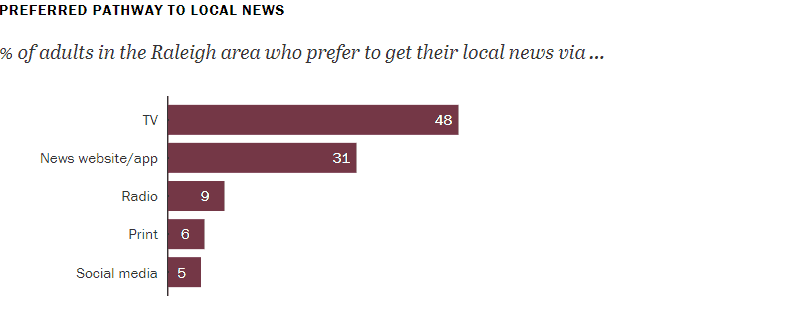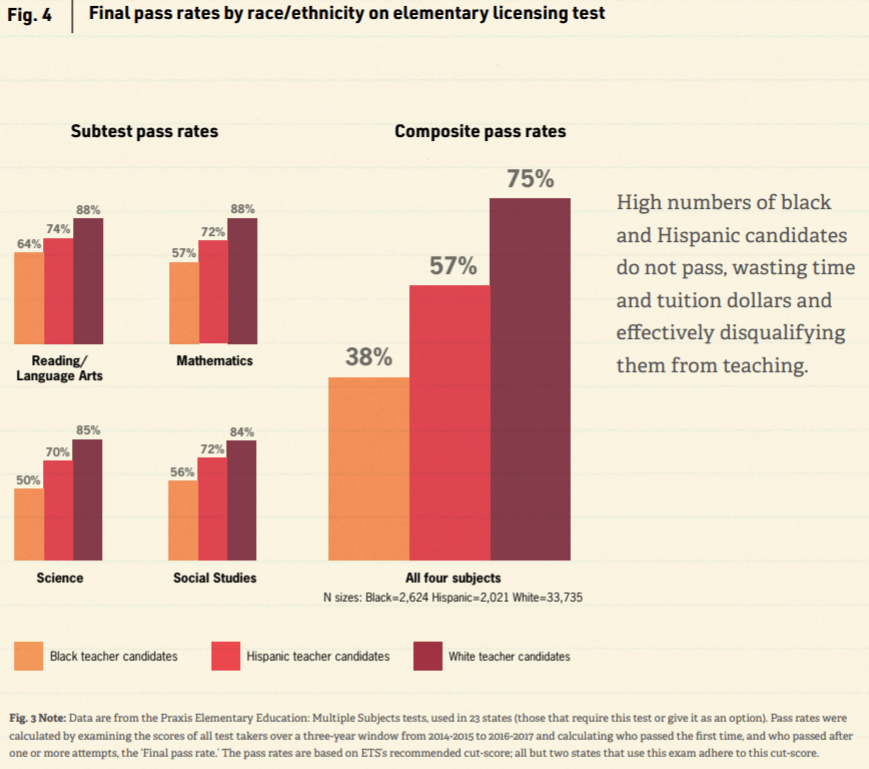In the News
Pew recently published a deep dive on local news in the U.S. They surveyed 35,000 adults across the country and present results for 99 CBSAs, or core-based statistical areas (area with an urban center and surrounding counties). For each CBSA, you can see how people get news, what news they feel is important, and whether they trust their local news sources. Here’s how people in Raleigh prefer to get their local news:

To get county-by-county data on local news in North Carolina, read this piece from EdNC’s Nation Hahn and Analisa Sorrells. In the article, you can enter your county to see the number of newspapers it has (if any — six counties in NC do not have a single newspaper). You can also share your opinion on your local news.

Dropping Knowledge
Fewer than half of teacher candidates pass their licensure exam (such as the Praxis) on their first attempt, according to a new report from The National Council on Teacher Quality. That number is even lower for teacher candidates of color. While candidates can retake the exams, doing so can cost up to $170 for all four sections of the Praxis, not to mention the time and resources spent on test prep.

The authors examined course requirements from more than 800 undergraduate and 250 graduate teacher prep programs and found that few require teacher candidates to take classes in the content matter they are expected to know to pass the tests. For example, elementary teachers need to know a wide range of content in English language arts, math, science, and social studies, yet teacher preparation programs do not require coursework in all areas.
Their solution is simple: teacher prep programs should require coursework on the relevant content teachers need to know. In analyzing 25 programs, the authors stated that three-fourths of them already had the necessary classes and would only need to make them required.
For Your Consideration
It’s well-known (now) that lead exposure is harmful for children, but less is known about the long-term effects on mental health. A new study followed a group of 579 children born in 1972 and 1973 who were exposed to lead in Dunedin, New Zealand through lead in gasoline. JAMA points out that this is the largest and longest psychiatric study of children exposed to lead. Here are the findings:
- “In 94% of the children, BLLs were above the level for clinical and environmental responses.
- Childhood BLL was significantly associated with higher general psychopathology, and internalizing and thought disorder symptoms in adulthood.
- Childhood BLL was significantly associated with lower conscientiousness and agreeableness and higher neuroticism in adulthood.
- Associations between childhood BLL and adult personality and psychopathology remained significant even after adjusting for sex, maternal IQ, socioeconomic status, and family history of mental illness.”
What we're reading
The People’s Session 2019: Initial results
This article includes initial results from the People's Session — an online project hosted by Reach NC Voices in February — along with information on how the project worked and who participated. ... Read the rest-
Want to Address Food Insecurity in Your Community? There's an App For That.
-
How 3-D Printing Could Break into the Building Industry
-
The Robots Are Coming. Career Pathways Programs Can Help Us Prepare.
-
Contraceptive Jewelry Could Offer a New Family Planning Approach
-
Fishing Interests to Get Say On Offshore Wind
-
Police Body Cameras Aren't Having the Effects Many Expected


